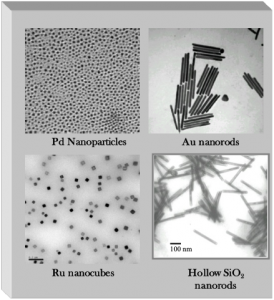
- This event has passed.
Sherine O. Obare, PhD: Tailored Nanoparticles for Advanced Environmental Applications
Tuesday, December 8, 2020 @ 4:00 pm - 5:00 pm
Please join us for Professor Sherine O. Obare’s talk, “Tailored Nanoparticles for Advanced Environmental Applications”, on December 8th at 4:00 pm.
Tailored Nanoparticles for Advanced Environmental Applications
Sherine O. Obare, PhD
Department of Nanoscience at UNC Greensboro
Joint School of Nanoscience and Nanoengineering
North Carolina A&T State University & University of North Carolina at Greensboro
Anthropogenic nanoparticles are of great interest due to their importance in advanced technological applications. Increased usage of nanoparticles in industrial processes as well as in commercial products continues to raise global concerns regarding their adverse impact on the environment and on human health. A critical issue that arises in understanding the environmental health and safety concerns of nanoparticles lies in their method of preparation and the properties of the nanoparticles that arise as a result of different preparation techniques.1 In order to obtain a molecular level understanding of the materials speciation and consequently transformation, it is necessary to develop well-defined and well-characterized nanoparticles. Advanced synthetic protocols developed by us have resulted in well-defined homogenous nanoparticles (Figure 1) that enable us to conduct studies to assess the toxicity of the nanoparticles and correlate the results specifically to the particle size, shape and composition.2,3 The results are paramount toward understanding nanoparticle properties in the environment. The presentation will showcase examples of nanoparticles in environmental settings, and their effect on biological processes. The interaction of nanoparticles with various environmental components and the analytical methods required for their assessment will be described. Our work will show a systematic method that leads to a critical understanding of the toxicity, bioavailability, and environmental fate and transport of nanoparticles.
Figure 1: Well-defined anthropogenic nanoparticles synthesized using a one-pot procedure
REFERENCES
- Dissanayake, N.M.; Arachchilage, J. S.; Samuels, T. A.; Obare, S. O. ‘Highly Sensitive Plasmonic Metal Nanoparticle-Based Sensors for the Detection of Organophosphorus Pesticides,’ Talanta 2019, 200, 218-227.
- Saeed, T. S.; Maddipatla, D.; Narakathu, B. B.; Albalawi, S. S.; Obare, S.O.; Atashbar, M. Z. ‘Synthesis of a novel hexaazatriphenylene derivative for the selective detection of copper ions in aqueous solution,’ RSC Advances 2019, 9, 39824 – 39833.
- Diaz, S. S.; Al-Zubaidi, H.; Ross-Obare, A. C.; Obare, S. O. ‘Chemical reduction of chlorpyrifos driven by flavin mononucleotide functionalized titanium (IV) dioxide’, Physical Sciences Reviews 2020. 2020-0007
Speaker Biography
 Dr. Sherine Obare is the Dean of the Joint School of Nanoscience and Nanoengineering, an innovative collaboration between North Carolina Agricultural and Technical State University and the University of North Carolina at Greensboro (UNC Greensboro). She is also a Full Professor of Nanoscience at UNC Greensboro. She received a Bachelor of Science degree in Chemistry from West Virginia State University, obtained a Doctor of Philosophy degree in Chemistry from the University of South Carolina, and thereafter, was a Camille and Henry Dreyfus Postdoctoral fellow at The Johns Hopkins University.
Dr. Sherine Obare is the Dean of the Joint School of Nanoscience and Nanoengineering, an innovative collaboration between North Carolina Agricultural and Technical State University and the University of North Carolina at Greensboro (UNC Greensboro). She is also a Full Professor of Nanoscience at UNC Greensboro. She received a Bachelor of Science degree in Chemistry from West Virginia State University, obtained a Doctor of Philosophy degree in Chemistry from the University of South Carolina, and thereafter, was a Camille and Henry Dreyfus Postdoctoral fellow at The Johns Hopkins University.
Dr. Obare is an environmental chemist whose research focuses on nanotechnology. Her work has led to innovations in the detection and remediation of environmental contaminants, designing nanoscale materials for drug delivery, improved healthcare, biomass conversion, and alternative energy, as well as understanding the fate, transport and toxicity of anthropogenic nanomaterials. She began her career at Western Michigan University as Assistant Professor of Chemistry in 2004, was promoted to Associate Professor in 2009, and to Full Professor in 2014. At Western Michigan University, she served in leadership roles as Associate Dean for Research in the College of Arts and Sciences and as Associate Vice President for Research. Dr. Obare’s research program has been funded by the National Science Foundation, the Department of Defense, the Army Research Office, the National Institutes of Health, the Department of Education, and the Michigan Economic Development Corporation.
Dr. Obare was recognized as a 2020 Outstanding Woman in Business, and a 2019 Power Player, by the Triad Business Journal. She is a 2019 Fellow of the American Chemical Society, a 2018 Fellow of the Council on Research of the Association of Public and Land-Grant Universities, the recipient of the 2009 International Union of Pure and Applied Chemistry (IUPAC) Young Observer Award, and a National Science Foundation CAREER award winner. She received the 2010 Lloyd N. Ferguson Young Scientist Award, and the 2010 National Science Foundation Division of Materials Research American Competitiveness and Innovation (ACI) Fellowship. In 2013, Obare was named as one of the top 25 Women Professors in Michigan. She was also recognized as a Science Spectrum Magazine Trailblazer in 2010, 2011, and 2012.
Dr. Obare has published over 100 publications in peer-reviewed journals and has served as editor for 5 books, including ‘Green Technologies for the Environment (2014)’, ‘The Power and Promise of Early Research (2016)’ and “Chemistry Education for a Sustainable Society (2020)’. She has mentored a large number of postdoctoral fellows, doctoral, masters, undergraduate and high school students in research. She has been highly active promoting science to elementary and middle school students locally and nationally. Dr. Obare serves as an Associate Editor for the Journal of Nanomaterials.


